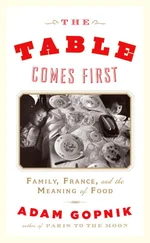It wasn’t hard to detect, beneath the sturdy, patriotic surface of the new name, an undercurrent of ironic, derisory minimalism. The French are prepared to be formally enthusiastic about American-style stadiums and American-style sports, but they are not going to get carried away by it all. This realization first came home to me when I joined a pioneer health club on the Left Bank and spent four months unsuccessfully trying to get some exercise there.
“An American gym?” Parisians asked when I said that I was looking for someplace to work out, and at first I didn’t know what to say. What would a French gym be like? Someone suggested that my wife and I join the Health Club at the Ritz; that was about as French as a gym could get. This sounded like a nice, glamorous thing to do, so we went for a trial visit. I ran out of the locker room and dived into the pool. White legs were dangling all around me—crowded to the edges, as though their owners were clinging to the sides of the pool in fear—and only after I rose to the surface did I see that the owners were all hanging from the edge of the pool, eating tea sandwiches off silver platters. Finally, after we’d done a lot of asking around, someone suggested a newly opening “New York-style” gym, which I’ll call the Regiment Rouge. One afternoon Martha and I walked over to see what it was like and found it down at the end of a long, winding street. The gym was wedged into the bottom two floors of an institutional-looking Haussmann-era building. We went in and found ourselves surrounded by the virtuous sounds of Activity—sawing and hammering and other plaster dust-producing noises. The bruit seemed to be rising from a cavernlike area in the basement. At the top of a grand opera-style staircase that led to the basement were three or four fabulously chic young women in red tracksuits—the Regiment Rouge!—that still managed to be fairly form-clinging. The women all had ravishing long hair and lightly applied makeup. When we told them that we wanted to abonner— subscribe—one of them whisked us off to her office and gave us the full spiel on the Regiment Rouge. It was going to bring the rigorous, uncompromising spirit of the New York health club to Paris: its discipline, its toughness, its regimental quality. They were just in the middle of having the work done—one could hear this downstairs—and it would all be finished by the end of the month. The locker rooms, the appareils Nautilus, the stationary bicycles with electronic displays, the steam baths, the massage tables—everything would be not just a l’americaine but tres New Yorkais. Best of all, she went on, they had organized a special “high-intensity” program in which, for the annual sum of about two thousand francs (four hundred dollars), you could make an inexorable New York—style commitment to your physique and visit the gym as often as once a week.
It was obvious that the once-a-week deal was the winner—the closer, in Mamet language—and that though she had a million arguments ready for people who thought that when it came to forme, once a week might be going overboard, she had nothing at all ready for people who thought once a week might not be forme enough. We asked her if we could possibly come more often than that, and she cautiously asked us what we meant by “often.” Well, three, perhaps four times a week, we said. It was not unknown, we added quickly, apologetically, for New Yorkers to visit a gym on an impulse, almost daily. Some New Yorkers, for that matter, arranged to go to their health club every morning before work. She echoed this cautiously too: They rise from their beds and exercise vigorously before breakfast? Yes, we said weakly. That must be a wearing regimen, she commented politely.
She paused, and then she said, wonderingly, “Ah, you mean you wish to abonner for an infinite number of visits?” After much fooling around with numbers and hurried, hushed conferences with other members of the regiment, she arrived at a price for an infinity of forme. The difference between once a week and infinity, by the way, turned out to be surprisingly small, improvised prices being one of the unpredictable pleasures of Paris life. She opened dossiers for both of us; you can’t do anything in France without having a dossier opened on your behalf.
A week later I dug out my old gym bag, cranked up my Walkman, and set off for the Regiment Rouge. When I arrived, the young women in the red tracksuits were still standing there. They looked more ravishing than ever. I picked out our consultant from the group and told her I was ready to get en forme. “ Alas, the work continues,” she announced. I peered down. The renovation seemed to have stopped just where it had been when I saw it before. “The vestiaires and the appareils will now be installed next month,” she said. “However, we are having classes all week long, on an emergency basis, and the Regiment Rouge wishes to make you an award for your patience.” Then she gave me a bag of chocolate truffles. (There is a health food store on the rue du Bac that displays in its window its own brand of chocolates and its own marque of champagne. Tout Biologique! a sign alongside them proclaims virtuously.) I ate one.
A week after that we got a phone call from our consultant. She proudly announced that things were ready at last, and there would be a crepe party in honor of the opening. “We will have apricot jam and creme de marrons,” she explained. We went to the crepe party. Everyone—would-be members and the girls in the red tracksuits—walked around eating stuffed crepes and admiring the pristine, shiny, untouched Nautilus machines and exercise bikes and free weights.
A few days later I went back again to try to use the gym, but on my way into the regimen room I was stopped by another of the girls in red tracksuits. Before one could start work on the machines, she explained, it was necessary that one have a rendezvous with a professeur. When I arrived the next day for my rendezvous, the professeur— another girl in a red tracksuit—was waiting for me in the little office. She had my dossier out, and she was reviewing it seriously.
“Aren’t we going to demonstrate the system of the machines?” I asked.
“Ah, that is for the future. This is the oral part of the rendezvous, where we review your body and its desires,” she said. If I blushed, she certainly didn’t. She made a lot of notes and then snapped my dossier shut and said that soon, she hoped, we could begin.
While all this was going on, I tried to tell Parisians about it, and I could see that they couldn’t see what, exactly, I thought was strange. The absence of the whole rhetoric and cult of sports and exercise is the single greatest difference between daily life in France and daily life in America. Its true that French women’s magazines are as deeply preoccupied with body image and appearance as American ones. Rut they are confident that all problems can be solved by lotions. The number of French ointments guaranteed to eliminate fat from the female body seems limitless, and no pharmacy window is complete without a startlingly erotic ad for the Fesse-Uplift—an electrical buttock stimulator, guaranteed to eliminate fat by a steady stream of “small, not unpleasing shocks administered to the area,” the ad says. Votre Beaute, the Self of France, recently had a special issue on losing weight. There were articles on electrical stimulation, on nutrition (raw carrots will help you lose weight; cooked carrots won’t), on antiobesity pills, and on something called passive exercise. There was also, of course, a long article on reducing lotions. Finally, buried in the back, among the lonely-hearts ads, was a single, vaguely illicit-looking page of workout diagrams. If all else fails.
Читать дальше












